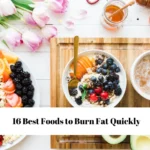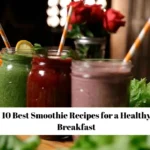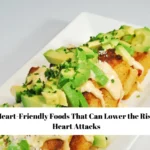Managing high blood pressure, or hypertension, is vital for maintaining heart health and reducing the risk of serious health complications. One of the most effective ways to control blood pressure is through dietary choices. While many foods can support cardiovascular health, there are specific items that individuals with hypertension should avoid to help keep their blood pressure in check.
In this article, we’ll explore 17 foods that can contribute to elevated blood pressure levels and provide insight into healthier alternatives. By making informed dietary choices, you can take significant steps towards a healthier lifestyle and better blood pressure management. Read on to discover which foods to steer clear of and how you can make a positive impact on your overall well-being.
1. Salt and Salty Foods
High sodium intake is one of the most significant contributors to high blood pressure. Salt can cause the body to retain water, which increases the volume of blood in circulation, leading to higher blood pressure. Processed foods, including canned soups, snacks, and deli meats, often contain excessive amounts of salt.
Even seemingly healthy options, such as pickles or salted nuts, can pack a sodium punch. The American Heart Association recommends limiting sodium intake to less than 2,300 milligrams per day, ideally aiming for 1,500 milligrams for those with hypertension. To manage blood pressure, it’s advisable to check food labels carefully and opt for low-sodium alternatives.
2. Processed and Packaged Foods
Many processed and packaged foods contain high levels of sodium, preservatives, and unhealthy fats that can negatively impact blood pressure. Items such as frozen dinners, snack foods, and ready-to-eat meals are often loaded with additives to enhance flavor and extend shelf life, but these ingredients can be detrimental to cardiovascular health.
Additionally, processed foods often lack essential nutrients, contributing to an overall poor diet that can exacerbate hypertension. It is best to focus on whole, unprocessed foods, such as fresh fruits, vegetables, and whole grains, which provide beneficial nutrients without the harmful additives.
3. Cured Meats
Cured meats like bacon, ham, sausages, and salami are notoriously high in sodium and unhealthy fats. The curing process typically involves adding salt and other preservatives to enhance flavor and prolong shelf life. This high sodium content can lead to water retention and increased blood pressure. Furthermore, many cured meats are also high in saturated fats, which can contribute to heart disease.
For individuals with hypertension, it is advisable to choose fresh, lean meats or plant-based protein sources as healthier alternatives. Exploring options such as grilled chicken or fish, legumes, and tofu can help maintain a balanced diet while managing blood pressure levels.
4. Sugary Foods and Beverages
Excessive sugar consumption, particularly from sugary drinks and snacks, can lead to weight gain and obesity, both of which are risk factors for high blood pressure. Beverages like soda, energy drinks, and sweetened coffee can quickly add up in terms of calorie and sugar intake, potentially leading to insulin resistance and increased blood pressure.
Additionally, high-sugar foods often lack essential nutrients and fiber, making them less satisfying and leading to overeating. Instead of sugary treats, individuals with high blood pressure should opt for natural sources of sweetness, such as fruits, which provide fiber, vitamins, and minerals that support overall health.
5. Alcohol
While moderate alcohol consumption may have some health benefits, excessive intake can lead to high blood pressure and other cardiovascular issues. Drinking alcohol can cause the blood vessels to constrict, leading to increased blood pressure. Furthermore, heavy drinking can contribute to weight gain and interfere with the effectiveness of antihypertensive medications.
The American Heart Association suggests that if alcohol is consumed, it should be done in moderation up to one drink per day for women and up to two drinks per day for men. Those with high blood pressure should consider limiting or abstaining from alcohol altogether to better manage their condition.
6. High-Fat Dairy Products
Full-fat dairy products, such as whole milk, cream, and full-fat cheeses, can contribute to increased blood pressure due to their high levels of saturated fats. Diets high in saturated fat can lead to weight gain and elevated cholesterol levels, both of which are risk factors for hypertension.
Instead of full-fat dairy, individuals with high blood pressure should consider low-fat or fat-free options, such as skim milk or yogurt, which provide essential nutrients like calcium and vitamin D without the added saturated fat. Incorporating plant-based dairy alternatives, like almond milk or soy yogurt, can also be beneficial for heart health.
7. Caffeinated Beverages
Caffeine can cause temporary spikes in blood pressure, especially in individuals who are sensitive to its effects. Beverages such as coffee, tea, and energy drinks can lead to increased heart rate and elevated blood pressure levels, which can be concerning for those already struggling with hypertension.
While moderate caffeine consumption is generally considered safe for most people, individuals with high blood pressure may want to monitor their intake and consider reducing or eliminating caffeine from their diet. Herbal teas and decaffeinated options can serve as healthier alternatives for those looking to limit their caffeine consumption.
8. Snack Foods
Many snack foods, including chips, pretzels, and crackers, are often high in sodium and unhealthy fats, making them poor choices for individuals with high blood pressure. These snacks are typically processed and may contain additives that can further exacerbate hypertension.
Additionally, their low nutritional value may lead to unhealthy snacking habits, contributing to weight gain. Opting for healthier snacks, such as fresh fruits, vegetables with hummus, or nuts in moderation, can help individuals manage their blood pressure while satisfying cravings for something crunchy or sweet.
9. Refined Grains
Refined grains, such as white bread, white rice, and pastries, are stripped of their natural fiber and nutrients during processing. This lack of fiber can lead to rapid spikes in blood sugar levels and contribute to weight gain, both of which are linked to increased blood pressure.
Additionally, many refined grain products are often high in added sugars and unhealthy fats, further compounding their negative impact on cardiovascular health. To support blood pressure management, individuals should focus on whole grains like brown rice, quinoa, and whole-grain bread, which provide essential nutrients and fiber that promote overall health.
10. Condiments and Sauces
Many condiments and sauces, such as ketchup, soy sauce, and salad dressings, can contain high levels of sodium and added sugars, making them detrimental to those with high blood pressure. For instance, just one tablespoon of soy sauce can contain over 1,000 milligrams of sodium, which significantly contributes to daily sodium intake.
Furthermore, sugary dressings can add unnecessary calories and lead to weight gain. To enhance meals without compromising health, individuals can opt for homemade dressings made from olive oil, vinegar, and herbs or use fresh herbs and spices for flavoring.
11. Potato Chips and Fried Foods
Potato chips and other fried foods are not only high in unhealthy fats but also often contain added salt. The frying process can create trans fats, which are linked to increased heart disease risk and hypertension. Additionally, the combination of unhealthy fats and high sodium levels can exacerbate weight gain and worsen blood pressure levels.
Instead of reaching for chips or fried snacks, individuals with hypertension should consider healthier alternatives, such as air-popped popcorn, baked sweet potato fries, or vegetable sticks with hummus, which provide flavor and crunch without the harmful effects on blood pressure.
12. Doughnuts and Pastries
Doughnuts and pastries are often loaded with refined sugars, unhealthy fats, and empty calories, making them poor choices for individuals with high blood pressure. These treats can lead to weight gain and increased blood sugar levels, both of which are risk factors for hypertension. Additionally, many pastries contain high levels of trans fats and sodium, which can further contribute to heart disease.
To satisfy a sweet craving, individuals should consider healthier options like homemade oatmeal cookies, fruit-based desserts, or yogurt parfaits made with fresh fruit and nuts, providing essential nutrients without the detrimental effects on blood pressure.
13. Certain Vegetables
While most vegetables are beneficial for overall health, certain varieties especially when prepared with high sodium—can negatively impact blood pressure. Vegetables like pickles, sauerkraut, and certain canned vegetables can contain excessive salt due to preservation methods.
Consuming these types of vegetables regularly can lead to increased sodium intake, which is detrimental for those managing hypertension. To ensure a healthy intake of vegetables, individuals should focus on fresh, frozen, or low-sodium canned options. Preparing vegetables with herbs and spices instead of salt can also enhance flavor without increasing sodium levels.
14. Pickled Foods
Pickled foods are often high in sodium, which can contribute to water retention and increased blood pressure. Common pickled items, such as cucumbers, onions, and olives, can be tasty additions to meals, but their high sodium content can negate their health benefits.
Individuals with high blood pressure should limit their intake of pickled foods or opt for low-sodium versions when available. Homemade pickled vegetables can also be a healthier alternative, allowing for control over the amount of salt used during the pickling process, ensuring a flavorful yet heart-healthy option.
15. High-Sugar Breakfast Cereals
Many breakfast cereals are marketed as healthy but can be laden with added sugars and refined grains. These high-sugar cereals can lead to quick spikes in blood sugar levels and contribute to weight gain, which are both linked to high blood pressure. Instead of sugary cereals, individuals with hypertension should look for whole-grain options that are low in sugar and high in fiber.
Oatmeal, for instance, is a great choice as it provides soluble fiber, which can help lower cholesterol levels and promote heart health. Adding fresh fruit or nuts to oatmeal can enhance its nutritional value without excessive sugar.
16. Baked Goods
Commercially prepared baked goods, such as cookies, muffins, and cakes, often contain high amounts of added sugars, unhealthy fats, and refined flour. These ingredients can contribute to weight gain, elevated blood sugar levels, and increased risk of heart disease.
Moreover, many baked goods are high in calories yet low in nutritional value, making them less satisfying and leading to overeating. Instead, individuals with high blood pressure should consider healthier homemade alternatives using whole-grain flours, natural sweeteners, and added fruits or nuts for flavor and nutrition.
17. High-Fat Meats
Certain cuts of meat, particularly those that are high in saturated fats, can contribute to increased blood pressure and heart disease risk. Meats like fatty cuts of beef, lamb, and pork can elevate cholesterol levels and lead to weight gain.
For those with hypertension, it’s essential to choose leaner protein sources, such as skinless poultry, fish, and plant-based proteins like beans and lentils. Additionally, when preparing meats, methods such as grilling, baking, or steaming are preferable to frying, which can add unnecessary fat and calories to meals.
Conclusion
In conclusion, avoiding certain foods is essential for effectively managing high blood pressure. By steering clear of high-sodium items, processed snacks, and sugary beverages, you can significantly reduce your risk of hypertension-related complications. Opting for fresh, whole foods and making healthier choices can lead to better heart health and improved overall well-being.
Remember, dietary changes are just one part of a comprehensive approach to managing blood pressure. Always consult with a healthcare professional for personalized advice and strategies tailored to your unique health needs.
FAQs
1. What foods should I avoid to lower my blood pressure?
To lower your blood pressure, avoid high-sodium foods, processed snacks, sugary drinks, and high-fat meats. Focus on whole, unprocessed foods for better health.
2. How does salt affect blood pressure?
Excessive salt intake can cause the body to retain water, increasing blood volume and leading to elevated blood pressure levels. Reducing sodium can help manage hypertension effectively.




